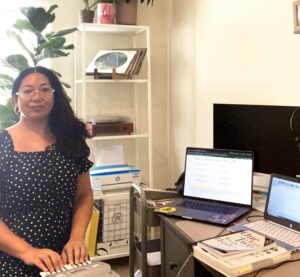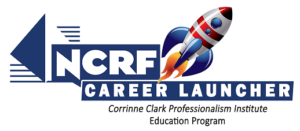The Court Reporting Internship course at Orleans Technical Institute in Philadelphia, Pa., is one of the school’s greatest program accomplishments. The Court Reporting Internship course prepares students to fill the demand for official courtroom and freelance reporters, broadcast captioners, and CART reporters.
The course also places students on externship sites, provides mentoring, and provides in-class instruction.
The school has onsite faculty and support staff dedicated to providing its interns with one-on-one career advice and job search assistance. In addition, the school’s employment specialist networks with employers from agency owners to local court systems, and that specialist builds relationships in order to help graduates find employment opportunities. Over the past five years, Orleans has maintained a 99 percent job placement rate.
Internship program overview
Internship is the capstone component of the court reporting program. It provides training and education in occupational settings both on-site as a classroom and mentorship experience and off-site as a court experience and a freelance experience.
The interns are introduced to four learning environments: classroom instruction, mentorship, court experience, and freelance experience. The intern receives educational credit upon completion of the internship along with the opportunity for a continued work site assignment leading to future employment. The internship component is a requirement for graduation, and it must be completed within one term.
The flow of all internship and externship activities is regulated by the instructional supervisor, the mentorship supervisor, and the internship coordinator. The internship class is set up for 60 hours of classroom time. The externship experience is set up for 90 hours over a 15-week period.
The court reporting curriculum pairs skill and speedbuilding on realtime steno equipment with additional courses in medical terminology, legal terminology, and court procedures. During the RPR class, students are given the opportunity to train for and receive their notary certification.
The court reporting program recently implemented the Realtime Coach online learning system as part of its curriculum. This program has helped all of its students increase speed and accuracy through structured practice sessions. The students develop computer-compatible, realtime machine shorthand skills of up to 225 words per minute, and they learn to transcribe and edit their own shorthand notes using CAT software.
An internship manual is available for the interns to use throughout the duration of their internship. This manual provides a comprehensive overview of the program and expectations along with the required forms needed for completion of the program.
The internship/classroom phase
The court reporting internship course has evolved into one of the most exciting experiences that the school’s students have encountered. In this course, students receive the final phase of court reporting instruction, which prepares them to successfully transition to the world of work. At this juncture, the students receive all of the necessary finishing tools needed to enable them to fill the demand for official courtroom and freelance reporters, broadcast captioners, and CART reporters. Under the guidance of the internship coordinator, the intern is expected to complete internship requirements during one semester.
Onsite: As a classroom and mentorship experience, the interns meet once a week with an instructional supervisor and a mentorship supervisor. The instructional supervisor meets one-on-one with the interns to review and analyze all transcripts and provide individualized feedback to enhance the professionalism of each student’s work.
The mentorship phase
The mentorship supervisor meets weekly with the interns to discuss their experiences and to assist in helping the interns make necessary adjustments as they plan for the other phases of their internships. The mentorship is there to provide students with support and clarity on issues that develop from externship experiences.
The captioning lab
Plans began three years ago to develop an internship component that would allow the students to gain experiences that would take them out of the classroom and into the actual worlds of court reporting, CART, and captioning. Sitting in the classroom and discussing different career tracks did not seem to be effective or productive. School officials and faculty felt that students should be provided with an atmosphere where they could experience the various career paths themselves. This would greatly contribute to their knowledge and their ability to make decisions about their futures.
The most exciting thing that has happened to the Orleans Technical Institute Court Reporting Internship is the implementation of a new captioning lab. The staff brainstormed and came up with the idea that if the upper-level students were exposed to the latest up-to-date technology and software prior to their graduation, it would help them become more confident and secure in the knowledge they obtained. The staff wanted to make all current steno technology and software possibilities available and accessible to them. Thus, the staff created a laboratory where students were allowed to work, utilizing all of the tools and equipment that the school was able to purchase, including up-to-date computers, monitors, speakers, and software. In the lab, the instructor and students are able to review video reenactments for classroom discussion and observation. Each computer is equipped with live and simulated captioning software. Different versions of the latest CAT software have also been installed. This provides an opportunity for the higher-level students to explore different versions before making a decision regarding the professional software they will need to purchase later on. They are exposed to as much professional equipment as possible in the lab, including Eclipse, Case CATalyst, and Stenovations. The lab is also equipped with live and simulated captioning software on each computer.
The externship phase
The internship coordinator is responsible for regulating all on-site and off-site internship activities. The interns must adhere to the established timelines, guidelines, rules, and regulations set by the internship coordinator for the duration of the externship period. All externship orientation and training is conducted by the school’s employment specialist or sponsor, who makes contact with NCRA or Pennsylvania Court Reporters Association members who are affiliated with court reporting agencies. The court reporting agency is informed of the requirements and expectations of the school’s externship program. Once the contact is initiated and solidified, the agency is approved by telephone or by mail and is asked to sign an externship site agreement, which provides written instructions for the students’ externship activities. The employment specialist/sponsor reviews the externship site agreement via telephone with the on-site supervisor. A packet of information is then sent to the on-site supervisor at the externship site to be signed and returned prior to the placement of students. Any other type of externship site training, follow-up pertaining to questions, daily logs, sponsor evaluations, oversight of students’ notes and transcripts, and so on, is the responsibility of the employment specialist/sponsor.
Each student arranges his or her out-of-school schedule individually with the sponsor to ensure that no conflicts exist in any program-related activities. The internship instructor and the mentorship instructor meet with each student once per week to discuss and review field experience and also to plan for the remainder of the student’s externship experience. In addition, a daily log sheet is completed and validated by the sponsor once a week. The sponsor agrees not to overburden the students with additional requirements over and above the school’s requirements because the students are still maintaining their speedbuilding and have academic responsibilities in addition to their externships. The interns are not allowed to work or earn pay while on externship.
The employment phase
The sponsor assigns actual court reporters to the interns, thus allowing them exposure to different types of procedures (i.e., arbitrations, workman’s compensation hearings, OSHA hearings, etc.). Upon completion of weekly assignments, the agency’s court reporter reviews the intern’s transcripts and renders an evaluation of the assignment on the daily log sheets. All evaluations are based on current industry standards as deemed by the on-site agency. Once the evaluations are received by the school, the transcripts are graded by the instructor according to NCRA standards. This creates an equitable and fair measurement of demonstrated competency and skill attainment of the students.
Orleans Technical Institute has been an ongoing and consistent source of well trained graduates in the Philadelphia area since 1986, maintaining a 99 percent placement rate. Another sign of the success of this program is that the majority of the Institute’s graduates received their first job offers during their internship phase.
EMPLOYER FEEDBACK FOR ORLEANS INTERNSHIP PROGRAM
“For several years, I have had the pleasure of participating in the internship program for court reporting students at Orleans Technical Institute. I can state emphatically that the students who have reached the pinnacle of graduation have been well prepared in all facets of court reporting. Some of Orleans Technical Institute’s interns have been working for my firm, Kaplan, Leaman, and Wolfe Court Reporters, for several years and have performed their duties with professionalism and exhibited exemplary skills and knowledge.”
Gregg B. Wolfe, RPR
Kaplan, Leaman and Wolfe Court Reporters
“As an employer of many graduates from Orleans Technical Institute’s court reporting program, I would highly recommend it to any sincere candidates. The staff at Orleans is dedicated and professional. The program is approved by NCRA and offers the highest quality preparation for this lucrative career. Graduates are placed immediately with either freelance firms or the court system. I have seen many programs, but Orleans is the best.”
Dianne M. Varallo-Kushmir, CMRS
DiscoveryWorks Global










